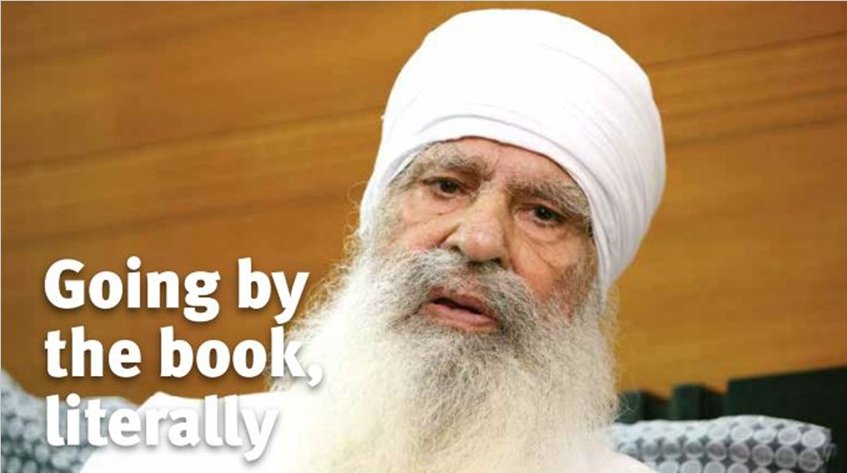
For lqbal Singh, education is more than books - it's a means to keep the youth of rural Punjab from taking to drugs and hitting the bottle
![]() or most, retirement Is a simple enough noun. It means end of work. Period. Not for lqbal Singh, though. For him, it was the beginning of a new phase - working to change life of many others. by providing them access to education at their doorstep, in villages in Punjab.
or most, retirement Is a simple enough noun. It means end of work. Period. Not for lqbal Singh, though. For him, it was the beginning of a new phase - working to change life of many others. by providing them access to education at their doorstep, in villages in Punjab.
Called "Babaji" by people who know him closely. Singh. now 89. has worked relentlessly toward one direction - imparting education in rural and marginalised areas to fight drugs and alcohol abuse in Punjab-since he retired as director of agriculture. Himachal Pradesh.
 In charge of Kalgidhar Trust since 1965. nearly two decades before he retired in 1987, Singh now oversees work of the organisation that runs 128 CBSE-affiliated English medium schools that have more than 60,000 children, most of them from rural Punjab. enrolled. Far away from the urban milieu. these schools focus on value-based education to children from marginalised sections of society. The Akal academies run by the Kalgidihar Trust are an example of how a not-for-profit organization can still earn profit even while focusing on social development.
In charge of Kalgidhar Trust since 1965. nearly two decades before he retired in 1987, Singh now oversees work of the organisation that runs 128 CBSE-affiliated English medium schools that have more than 60,000 children, most of them from rural Punjab. enrolled. Far away from the urban milieu. these schools focus on value-based education to children from marginalised sections of society. The Akal academies run by the Kalgidihar Trust are an example of how a not-for-profit organization can still earn profit even while focusing on social development.
Admitting that it is no easy task to run schools in villages where educa-tion still retains its novelty factor. Singh says, "More than 55 percent children here are first-generation learners."
The Beginning
Singh was studying agriculture at Am-ritsar's Khalsa college in the late 1940$ when he first heard a lecture by Teja Singh. a former principal of the college. Teja Singh advocated education for girls and blending education with spirituality for all, and that one lecture proved to be a turning point in young lqbal Singh's life.
Taken in by the academic turned. activist's strong will to change the soci-ety, Singh decided to work with him. After completing his post-graduation in agriculture. Singh joined the Punjab government as a research assistant against his father's desire. The Singhs were financially sound, and young lqbal's father always wanted him to go abroad for higher education. Singh. however, wanted to follow the footsteps of his mentor Teja Singh.
A year later, in 1952, Singh left his job with the Punjab government and joined the Himachal government to work closely with Teja Singh, who was working to establish the Kalgidhar trust, a not-for-profit charitable organisation.
Singh started working closely with the trust and helped it to search and zoom in on the location of its first academy. Four years later, they settled for a 400-acre plot at a place called Baru. about 60 km from Solan in Himachal.
In 1965, Singh assumed charge of the Trust after Teja Singh's death and got deeply involved in operationalising the mission to combine modern educa-tion with faith while still working with the government.
In 1982. Singh was promoted as the director of agriculture department.
Post-retirement. Singh established the first academy in 1987 - a one-room school at Baru, with five students. Singh says he used his pension money to have the 'building' constructed and manage the academy for the first year. it was all jungle then and we faced a lot of criticism initially. People said we were fouls to establish a school where no one would come." says Singh. The following year more than 70 children from nearby districts took admission. "Many families also came forward to help the trust that year."
The Akal academy. Singh says. believes in imparting value-based education that not only meets the demands of the time but also trains students to use their skills for society's welfare. "Education is provided to students it respective of their caste. religion, eth nic background or gender. We work to develop love for education in children in the initial years and support them with adequate infrastructure to supplement that through their academic life," the octogenarian says.
But soon it was realised that establish-ing one academy in Himachal would not solve problems faced by children in nearby districts. This was also the time when the drug and alcohol problem was increasing in Punjab and many families saw childrengoing astray.
As the Baru academy established its place with its unique focus on education, families from many Punjab villages requested Singh and his team to open more academies and help save their children from getting trapped in the drug menace. "It was difficult for us to accommodate all the children in Baru Sahib. So we thought of opening academies in the villages itself."
The trust. thus, opened the first Akal academy in Muktsar in 1993.
Spreading the wings
The Mukisat school was meant for children from marginalised areas but it was not a free school, Singh em-phasises. -There were two reasons for this. First, students do not value the education they get if they are not
charged and. second, if schools depend on donations, they would close down the moment donations dry up."
The school, Singh says. charges a minimal tuition fee from students.
 |
| "Building such a large number of schools is not possible if we just depend on people to help us. Also, academies are required now - we can't wait for years to build them. That's why the trust took a 90-chore loan to establish the academies." |
| Ravinderpal Singh Kohli |
By 1999, the trust had opened 19 academies across Punjab. with the next string of academies coming up in 2007. and the count going up to 128 today.
Almost 80 percent of land for setting up the schools has been donated by the villagers. Emphasising that these schools are as good as any urban English-medium private school, Singh says teaching aids like television and the interact are used extensively in the classrooms.
Beginning with a few students and up to class II, all new schools are expanded gradually to include higher classes. All academies are day boarding so that children can spend maximum time at school. if they spend less time outside it would help them stay away from the bad environment."
Challenges, working around them The biggest challenge the academies Geed was to provide quality teach-ers in villages. "It was difficult to find teachers in villages. or to ask them to come from cities every day." Singh ex-plains. To solve the problem the trust started a free elementary teacher's ed-ucation programme for young village girls in 2006. At present. it runs three centres in Punjab which have trained more than 2,000 teachers so far.
As pan of the training module, girls who have cleared either class X or XII are given free education and trained to teach in these academies later.
Asked why he chose education to help the community. Singh says. "We wanted to focus on creating good human beings, which can be done only Through valuebased education. Children have the most impressionable minds and it is easy to mould them. They can create wonders If are put on the right path."
These schools have played a big role in not just helping students stay away from drugs and alcohol abuse but have also motivated their parents to leave these habits.
"Punjab depends heavily on revenue from sale of liquor but in the recent past many sarpanches (village heads) have made their villages liquor-free. Children studying in these academies have been partnered in various drives by the state police against the use of drugs and liquor." says Ravinderpal Singh Kohli. who left his garment business to work with the Trust.
Specifying that the trust aims to open 500 new academies over the next few years, Kohli says: "Building 10-20 schools was not a problem. But building such a large number of schools is not possible if we just depend on people to come fonvard to help us. Also. academies are required now - we can't wait for years to build them. That's the reason the trust has taken a 90-crore loan to establish the academies."
Iqbal Singh makes it a point to stress that Kalgidhar's success is not the story of a -one man army". -Many people have contributed in educating children. For example, the doctor cou-ple. Dr Devendra Singh and his wife Dr Neelam Kaur. who now works with the academy at Baru Sahib as director and principal, left their well-paid government jobs in Delhi to join the trust in its initial years: he points out.
Meanwhile, the game could have barely begun for the 89-year-old, for the trust is now working to set up a university in Punjab.
Courtesy: Sikhs Helping Sikhs [email protected]
For more information please visit website www.sikhshelpingsikhs.com

